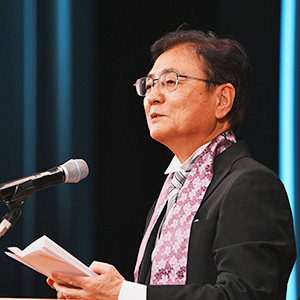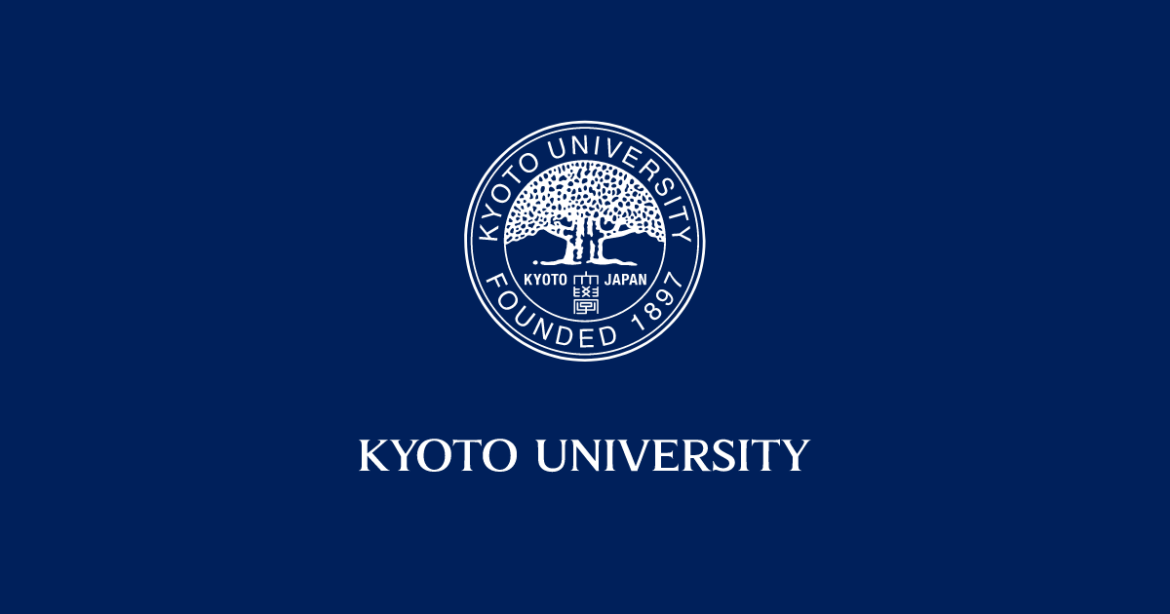
Today, Kyoto University is proud to award master’s degrees to 106 students, professional master’s degrees to 6 students, and doctoral degrees to 209 students. Of these graduates, 185 are from overseas. Let me begin by offering my sincere congratulations to all of you on your accomplishments.
With today’s ceremony, Kyoto University will have awarded a cumulative total of 95,151 master’s degrees, 2,869 professional master’s degrees, 3,055 juris doctor degrees, and 49,718 doctoral degrees. On behalf of the university’s faculty and staff, I would like to extend my congratulations to each and every one of you on receiving your degrees.
As of today, you are all holders of academic degrees from Kyoto University. I think that the reputation of universities and degrees has never been a matter of such widespread public concern as it is today. The background to this is Japan’s “30 lost years,” a period marked by economic stagnation and diminishing international competitiveness in Japan that began with the collapse of the bubble economy and continues to this day, resulting in stagnation in society as a whole. In this social climate, the expectations placed on universities and academic knowledge to contribute to economic growth and social revitalization are higher than ever. One manifestation of that is the rapidly growing voice, particularly in recent years in the government and business sectors, calling for the active participation and contribution of degree holders in society as a whole.
However, although Japan’s graduate school enrollment rate has clearly increased since the University Council of Japan recommended doubling graduate school enrollments in 1991, the proportion of people with degrees per million population remains remarkably low compared to other OECD member developed countries. According to the Ministry of Education, Culture, Sports, Science and Technology’s Science and Technology Indicators 2024, Japan’s number of master’s and doctoral degree holders per million population in 2021 is extremely low compared to the United States, the United Kingdom, Germany, and other countries. The number of master’s degree holders in Japan is only 10.8% of that in the UK, 22.2% of that in Germany, and 22.3% of that in the US. If we compare the number of doctoral degree holders in Japan to the countries with the highest numbers, Japan’s figure is 36.6% of the number in South Korea, 36.8% of the number in the UK, and 38.2% of the number in Germany.
If we look at the balance of fields, while the humanities and social sciences are most prevalent among bachelor’s degree holders in all countries, Japan shows a trend toward natural sciences becoming more prevalent among master’s and doctoral degree holders. Furthermore, if we look at the career paths of degree holders, while in Western countries they go on to play a wide range of leadership roles throughout society, including in politics, government, industry, the media, and nonprofit organizations, in Japan they tend to be concentrated in academia, such as at universities and research institutes. For example, according to a recent Ministry of Economy, Trade and Industry report, in the US, 39.2% of doctoral degree recipients employed in 2017 were employed by universities, while 56.2% were employed by private companies—figures which are in stark contrast to Japan. There is no doubt that, in Japan, graduate-level degree research has widely been viewed primarily as a career path leading to teaching or research positions in academia. In other words, one of the reasons for the lack of growth in the number of degree-holders in Japan appears to be the limited career paths available. This seems to be making the situation even more serious, as in recent years, while the number of people obtaining doctorates has been increasing in the US, China, South Korea and other countries, Japan is the only country where that number is decreasing.
The current graduate school system began in the late 19th century in the US as a program to provide students who had completed a bachelor’s degree with more advanced academic and scientific education, and award them with master’s degrees. In that system, a doctoral degree holder’s career as a professional researcher was generally achieved through a postdoctoral fellowship, a training period of several years designed to enable them to become independent researchers. However, in Japan, the postdoctoral fellowship system has never taken root. The reason for this is unclear, but it may be because, in the past, Japanese doctoral recipients often served as postdoctoral fellows at the universities or research institutes where they studied abroad.
Even in such difficult circumstances, the degree research of Japanese graduate students has played an important role as the vanguard of Japan’s research activities in the midst of fierce international competition. In that sense, I believe the research level of Japan’s graduate programs should be highly rated. There is even a discussion about whether Japanese graduate students should be paid salaries as professional researchers. Of course, graduate school is merely an educational program, and what is needed is not a salary but a sufficient scholarship that includes living expenses.
However, this emphasis on professional research careers may be one of the reasons why Japan’s degree holders have been denied the opportunity to play active roles not only in academia but also in diverse areas of society, including central and local government, industry, the media, nonprofit organizations, and think tanks. In your graduate studies, you set your own research goals and engaged in many discussions with your supervisors, seniors, and peers, while engaged in various research projects. Furthermore, you developed plans to address challenges, acquired the necessary knowledge and skills, and ultimately completed your thesis under your own responsibility. What society expects of you is not merely the thesis itself, as the outcome of your research, but rather the entirety of this process—the experience and skills you have gained firsthand through the actual process of writing your thesis. That is the sum total of the knowledge and abilities you can use to address problems you encounter or are required to solve in the real world, and what is known in Western countries as “transferable skills.” These types of versatile skills, which can be applied to any field, include “problem-solving skills” for identifying problems and working to solve them, “personal skills” for organizing one’s own initiative to tackle challenges, and “interpersonal skills” for building teams and relationships to achieve tangible results. There is no doubt that people with such transferable skills are needed more than ever before to address the various problems faced by modern society.
With regard to the career paths of degree holders, I would like to discuss entrepreneurship, which has gained significant attention in recent years. Entrepreneurship, commonly referred to as entrepreneurial spirit, broadly refers to the mindset and actions that bring innovation to society and create new value. In the European Union (EU), entrepreneurship has long been positioned as an important educational policy—as one of the “key set of competences needed for personal development, social inclusion, active citizenship, and employment.” University-launched startups and business ventures, which have become a major trend in Japan in recent years, are a prime example of this. They entail taking certain risks to directly transform the intellectual achievements of your university research into social value. Unlike a general business venture, whose main purpose is to generate profit, many university-launched startups and business ventures are founded on a clear desire to actively contribute to society by applying the results of academic research activities. Business ventures that demonstrate a particularly strong intention to contribute by providing new visions for addressing the social and environmental challenges faced by humanity today are known as “impact startups.” More than 400 startups have already been launched at Kyoto University, encompassing a truly diverse range of activities, including the development of new energy sources and materials using innovative technologies known as deep tech, tackling environmental and food issues with original ideas, contributing to human health and welfare with cutting-edge research, and supporting the activities of society through concentrated specialized knowledge. Entrepreneurship may well guide the unique outcomes of your degree research toward new horizons in the future.
At long last, expectations are rapidly growing in Japan for degree holders to fully utilize their acquired knowledge and abilities to make active contributions across all sectors of society. As you now embark on new journeys—whether into further research or other diverse fields of endeavor—your bold commitment to tackling the various challenges you face in your respective fields will surely be a great inspiration to the students who follow you. I sincerely hope that your achievements, as true intellectual elites, earning society’s unwavering recognition and respect, will further elevate the social standing of degree holders in Japan, and I would like to conclude my congratulations with that heartfelt wish.
Once again, I extend my sincere congratulations to each of you.


AloJapan.com